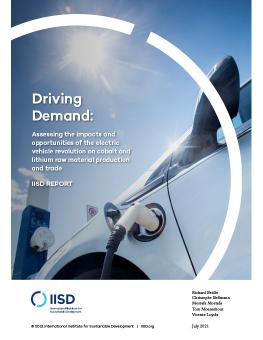
Driving Demand: Assessing the impacts and opportunities of the electric vehicle revolution on cobalt and lithium raw material production and trade
This report assesses the impact and opportunities for developing countries of the boom in demand for raw materials entering into the production of electric vehicle batteries. In particular, it describes how trade policy could play an important role in helping them capture value from this expansion while managing the risks of overinvestment.
-
Demand for lithium as a component of lithium-ion batteries will continue to rise in the coming decades. By contrast, the market for cobalt is likely to tighten given the mineral's toxicity and the environmental, social, and governance problems associated with its mining.
-
Chile, which holds 50% of global reserves, illustrates the opportunities for revenue generation and value addition that the EV boom presents, but ensuring investment contributes to development objectives will require coordination across several areas of policy and engagement with local stakeholders.
-
The Democratic Republic of the Congo, which holds a virtual monopoly on the world's supply of cobalt, illustrates a situation with a real risk of overinvestment. Revenues should be reinvested in basic infrastructure, governance, and education required to provide mining-related services to other local extractive industries.
The electric vehicle (EV) industry has grown significantly in the last few years. The main EV component is the battery, which accounts for one quarter to one third of the vehicle’s total cost of production. Two important materials of lithium-ion batteries today are lithium and cobalt. These are found in large amounts in developing countries. The growing interest and projected increase in manufacturing EVs and the subsequent rising demand for specific minerals presents a key opportunity for developing countries that are some of the main producers and suppliers of these minerals.
Their ability to take advantage of this opportunity, however, is dependent on economic and political readiness to manage sustainable investment as well as the trade policies. Evolving technology also brings risks to raw material producers. This policy brief considers the impact of the EV raw materials boom on developing countries and how trade policy could play an important role in helping them capture value from this expansion while managing the risks of overinvestment.
Participating experts
You might also be interested in
Source to Sea: Integrating the water agenda in 2023
2023 could prove to be a definitive year for facilitating an integrative perspective on water issues, from fresh water to the marine environment.
Une course aux subventions aux armements s’engage entre l’Europe et l’Amérique (in French)
Lorsque le président américain Joe Biden a promulgué la loi sur la réduction de l’inflation, il a promulgué le plus grand investissement climatique de l’histoire américaine – un moment historique pour une nation qui pompe plus de carbone dans l’atmosphère que n’importe quel pays à l’exception de la Chine.
December 2024 | Carbon Minefields Oil and Gas Exploration Monitor
In November 2024, 23 oil and gas exploration licences were awarded across five countries, with Russia granting the licences that account for the largest portion of embodied emissions.
Agreement on Climate Change, Trade and Sustainability: A landmark pact for trade and sustainability
The ACCTS pact, signed by Costa Rica, Iceland, New Zealand, and Switzerland, aligns trade and environmental policies, tackling fossil fuel subsidies, eco-labels, and green trade.